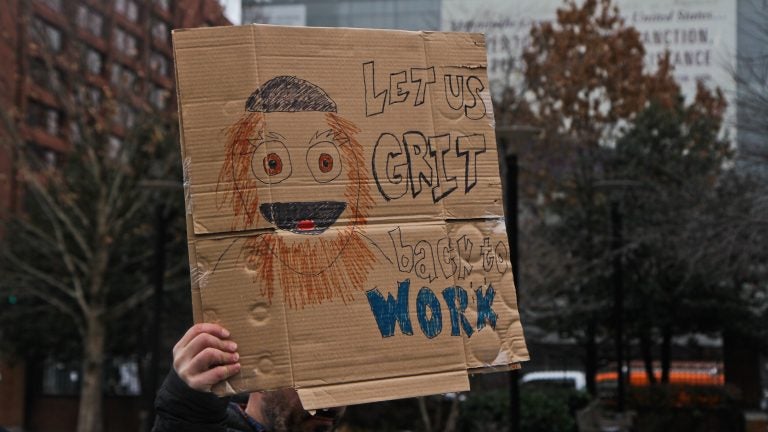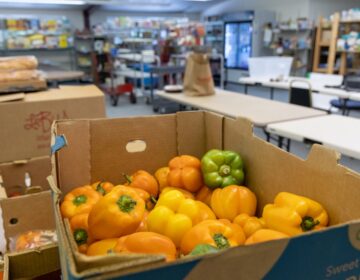Here’s everything Philly loses if the government shutdown keeps going
Local orgs are scrambling to help with food, housing, safety and cash.

Federal government employees rally to call for an end to the shutdown on Independence Mall Tuesday. (Kimberly Paynter/WHYY)
This story originally appeared on Billy Penn.
—
North Philly resident Sheila Armstrong went out last week and bought a deep freezer, then packed it full of meat. She also stocked her shelves with all the canned goods they could hold.
The emergency she’s preparing for? It’s already partly here — but it could get much worse.
“Like any other low-income, single parent in the city, I’m definitely worried about this,” Armstrong told Billy Penn about the federal government shutdown. So far, services the 42-year-old mother relies on haven’t been cut off, but if the closure lasts much longer, it’s likely they will.
“We know we have children we have to raise,” she said, “and we have to worry about how we’re going to feed them.”
Armstrong has had jobs in politics and education, but she’s currently unemployed. She depends on federal programs like SNAP for food, TANF for cash assistance and Medicaid for healthcare to keep her family afloat.
“It’s scary,” Armstrong said. “I’m trying to keep my senses. I’m just praying and listening to God music.”
A long line that’s getting longer. @Philabundance and other organizations set up an “emergency market” in South Philadelphia for government employees. @KYWNewsradio #GovernmentShutdown pic.twitter.com/vSw2gRoI6F
— Tim Jimenez (@TimJRadio) January 23, 2019
Philadelphia remains the poorest big city in the country, and the rate of people who are experiencing hunger here continues to grow year after year. Nearly 500,000 Philadelphians received food stamps in 2016.
Threatened by the shutdown
Some federal services have already lost funding. If the shutdown continues, even more will follow suit:
HUD
Funding has already been totally frozen for this federal public housing program, which contributes nearly $100 million in funding to Philly programs and nonprofits. Depending on when those groups were set to sign contracts, some are facing gaps in funding.
TANF
This cash assistance program is set to run out at the end of January.
WIC
This food assistance program for women with children has the funding to last until around mid-February.
SNAP
Recipients were given double the food stamps in January to cover the month of February. If the shutdown lasts until March, SNAP’s future is unknown.
Domestic violence programs
Justice Department funds for the Violence Against Women Act and the Victims of Crime Act will last until March 1.
Medicaid and CHIP
These are good through September 2019.
LIHEAP
This program, which helps Philly residents heat their homes, will continue until the end of the year.
Social Security
All good here — this one’s got a contingency plan that keeps it going no matter how long the shutdown lasts.
So most of these programs haven’t run out… yet.
Still, the fear alone that benefits might be cut off is enough to generate anxiety for Philly’s low-income residents.
“Knowing that they gave us all of our February benefits in January, I’m really scared to spend what I have,” said Shaniqua Chisholm, a 28-year-old single mother. “Food runs out fast.”
Currently unemployed, Chisholm is working hard to get back on her feet. She’s starting a job-training program in Center City later this month.
But she knows it’ll take time to save some money — especially because she doesn’t have a permanent home of her own, and she’s staying on and off with friends and family members around the city.
“Right now, I’m not in a stable home, and I depend on the cash that they do give me,” she said. “This shutdown is kind of making things worse.”
Already feeling the pinch
Some local programs have already been impacted. With the possibility of losing their federal funding in March, orgs like the Lutheran Settlement House and Women Against Abuse are operating on razor-thin margins.
“We have worked hard to be financially prepared for the shut down,” said Katie Young-Wildes, a spokesperson for Women Against Abuse. “That said, we do not know how long the partial shutdown will last, and a lengthy one would certainly impact our cash flow.”
But moving forward, Young-Wildes said the org is worried how its clients will fare if the shutdown continues.
“Our clients are already encountering severe barriers in breaking free from abusive relationships and rebuilding safety and stability for themselves and their children,” she said. “A lack of public benefits and resources exacerbates an already challenging and vulnerable situation.”
Local programs that receive HUD funding are struggling, too. Like Pathways to Housing PA, which was supposed to re-up its $3.4 million federal contribution this month — until the shutdown hit.
“The reality is setting in that we need to start putting emergency plans in place,” said Christine Simiriglia, Pathways’ president and CEO.
For the Philly-based organization, that missing HUD money normally pays for 133 affordable housing units. Without it, Simiriglia said the nonprofit has been dipping into its savings — a practice that isn’t sustainable in the long-term.
She estimates Pathways can keep going like this for at most another four months.
“We’re probably going to be OK,” Simiriglia said. “We’re at a size where we have a little money in the bank, a little credit.”
“But a lot of smaller organizations, they’re not going to be OK,” she added. “They don’t have the line of credit. They’re not going to be able to pay people’s rent.”
Therein lies the ripple effect: if these organizations go belly up, then low-income Philadelphians will lose their valuable services, like subsidized housing. More people will end up homeless.
In the meantime, Simiriglia is constantly running the numbers. She’s adding up how much money she’ll need to stay afloat, and whether the organization could conceivably buy groceries for people if SNAP benefits run out.
“In our logical minds we’re saying that will never happen,” she said, “but I don’t know at this point.”
How local organizations will try to help
If the shutdown continues, here’s a look at how local organizations might pick up the slack:
Cash
Also known as cash welfare, the Temporary Assistance for Needy Families program would become the responsibility of Pennsylvania’s state government if the shutdown continued past February. This happened during the 2013 shutdown, and Arizona was the only state that opted to cut the program entirely.
Safety
Women Against Abuse is working to redistribute its funding and stay open as long as the shutdown lasts.
Food
Should the shutdown continue until March, nonprofits hope to fill in the gaps. Both Pathways to Housing PA and Philabundance are exploring ways to feed SNAP recipients who lose their benefits. (If you are a SNAP recipient, click through the Philabundance website to find a food bank near you.)
Housing
The Philadelphia Housing Authority — Philly’s public housing department — has some wiggle room in its budget to make up for a loss in federal funding. PHA’s savings should keep the department afloat for another month.
Healthcare
Folks aren’t in danger of losing their Medicaid benefits any time soon. But if it comes to that, you can visit the city’s network of health clinics that charge based on your income and the size of your family. Nonprofits like Puentas de Salud also offer inexpensive healthcare.
Heat
Locally, PGW has a handful of options for low-income customers, like payment plans and a senior citizen discount.
—
 Billy Penn is one of 22 news organizations producing Broke in Philly, a collaborative reporting project on economic justice. Read more at brokeinphilly.org or follow at @BrokeInPhilly.
Billy Penn is one of 22 news organizations producing Broke in Philly, a collaborative reporting project on economic justice. Read more at brokeinphilly.org or follow at @BrokeInPhilly.
WHYY is your source for fact-based, in-depth journalism and information. As a nonprofit organization, we rely on financial support from readers like you. Please give today.




